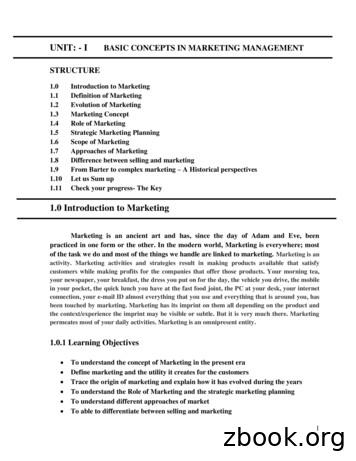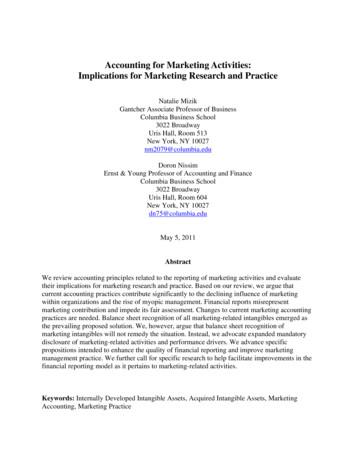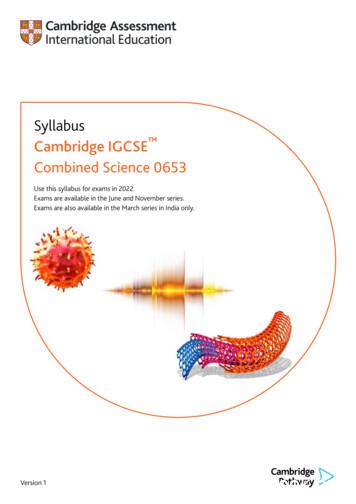IM Syllabus (2021): Marketing - University Of Malta
IM Syllabus (2021): MarketingIM SYLLABUS (2021)IM 23MARKETINGSYLLABUS1
IM 23 MarketingSyllabus AddendumMitigating factors for 2021 MATSEC Examinations SessionTo omit the following content from the topics:H. DISTRIBUTION STRATEGY2. Retailinga.Types of retailersChanges in Subject ContentI. COMMUNICATIONS STRATEGY2. Advertisingc.Evaluating advertising effectiveness and the return onadvertising investment.5. Sales promotiona.Growth of sales promotion6. Direct marketingb.Benefits to buyersc.Benefits to sellersChanges in CourseworkN/AChanges in Exam Paper(s)No changes.MATSEC Examinations BoardOctober 2020
IM Syllabus (2021): MarketingMarketing IM 23Syllabus(Available in September)1 Paper (3 hours)Syllabus objectivesThe syllabus is intended to encourage candidates to:Understand and appreciate the nature and scope of marketing and its role in industry and society;Appreciate that marketing can be studied from the perspective of a range of stakeholders within thecontext of the internal and external environments;Be aware of the economic, environmental, and technological issues associated with marketingpractices;Develop critical understanding of consumers, goods and services providers, marketingorganisations and the importance of adding value.The emphasis is on the application of concepts and issues within the local and international contextswhere relevant.AssessmentCandidates will be assessed on the following:Knowledge and comprehension of the topics specified in the syllabus;Application of knowledge to challenges and issues within local and international situations;Analysis of problems, issues and situations by making valid inferences, organising ideas anddeveloping a framework of understanding of the subject.PAPERMARKS3 hoursSection ACirca 8 to 12 short answer questionsAll questions are compulsory40% total for the sectionCirca 3 to 7 marks per questionSection B2 essays from a choice of 360% 2 x 30% each100% Total2
IM Syllabus (2021): MarketingPaper 1Section AThe short answer questions in Section A are designed to test the candidates’ knowledge andcomprehension of the fundamental principles of marketing.Section BThe essay questions in Section B are designed to test the knowledge, comprehension, application andanalysis of marketing principles and practices. The essay type answers provide scope to describemarketing terminology and frameworks in more detail and to analyse how they are implemented inorganisations and markets.Knowledge and comprehension are typically expressed through: marketing terminology and itsmeaning, outlines of marketing frameworks in the form of lists, tables and diagrams, whichsummarise complex principles, concepts, practices, processes and contexts.Application and analysis are typically expressed through: problem solving by using knowledgeand appropriate generalization of the main principles of marketing, identification of informationinto component parts and the ability to debate, differentiate, appraise and examine concepts.3
IM Syllabus (2021): MarketingSyllabusA. CREATING AND CAPTURING CUSTOMER VALUED. BUYER BEHAVIOUR1. Marketing, definition2. Customer needs, wants and demands3. Market offerings – goods, services, experiences4. Customer value and satisfaction5. Exchanges and relationships6. Markets7. Marketing management orientations8. Customer relationship management, definition9. Creating customer loyalty and retention10. Growing market and revenue share11. Building customer equity12. M Marketing mix, a brief introduction, 4Ps, 7Ps1. Consumer buying behaviourA brief introductionB. ANALYSING THE MARKETING ENVIRONMENT1.a.b.c.d.e.f.The microenvironmentThe companySuppliersMarketing .e.f.g.The macroenvironmentThe demographic environmentThe economic environmentThe natural environmentThe technological environmentThe political environmentThe social environmentThe cultural environmentC. CUSTOMER INSIGHTS1.a.b.c.d.e.f.g.h.i.j.Marketing ResearchMarketing research processDefining the problem and research objectivesDeveloping the research planGathering secondary dataPrimary data collection:Research approachesContact methodsSampling planResearch instrumentsPresenting findings through info-graphics2. Characteristics affecting consumer buyingbehavioura. Cultural factorsb. Social factorsc. Personal factorsd. Psychological factors3.a.b.c.d.e.Consumer buyer decision processNeed recognitionInformation searchEvaluation of alternativesPurchase decisionPost purchase behaviourE. M ARKET SEGMENTATION AND TARGETING1.a.b.c.d.SegmentationSegmenting consumer marketsSegmenting business marketsSegmenting international marketsRequirements for effective segmentation2. Market Targetinga. Evaluating market segmentsb. Selecting target market segments3. Positioning strategy - brief introductionF. PRODUCT STRATEGY1.a.b.c.d.Goods, services and brandsGoods, services and experiencesLevels of goods and servicesGoods and service classificationsThe nature and characteristics of a service2.a.b.c.d.e.Product life-cycle strategiesDevelopment stage (definition)Introduction stageGrowth stageMaturity stageDecline stageG. PRICING STRATEGY1. Pricing defined2. Price elasticity of demand - definition3.a.b.c.ADVANCED Level, Marketing, MATSECMajor pricing strategiesCustomer value-based pricingCost-based pricingCompetition-based pricing4
IM Syllabus (2021): MarketingH. DISTRIBUTION STRATEGY1. Nature and importance of channelsa. How channel members add valueb. Channel levels, roles and functions2. Retailinga. Types of retailersb. Retailing trends and developments3. Wholesalinga. Definition of wholesalersI. COMMUNICATIONS STRATEGY1. The promotion / communication mixa. Integrated marketing communicationsb. Communications process2.a.b.c.AdvertisingSetting advertising objectivesTypes of mediaEvaluating advertising effectiveness and thereturn on advertising investment5.a.b.c.Sales promotionGrowth of sales promotionSales promotion objectivesMain sales promotion tools6.a.b.c.d.e.f.g.h.Direct marketingDirect-marketing modelBenefits to buyersBenefits to sellersDirect-mail marketingCatalogue marketingTelephone marketingDirect-response television marketingKiosk marketing7. Digital and online technologya. Marketing and the Internetb. Online marketing models:B2C, B2B, C2C and C2Bc. Establishing an online marketing presenced. Creating a websitee. Placing ads and promotions onlinef. Participating in social networkg. Email marketing3. Public relationsa. The role and impact of PRb. Major PR tools4.a.b.c.Personal sellingNature of personal sellingRole of the sales forceSteps in the selling processLearning and teaching resourcesMain textbookPrinciples of Marketing, European Edition. Kotler et al., Pearson Education.Additional readingsEssentials of Marketing, Blythe, Routledge.Foundations of Marketing. International edition. Pride et al., Cengage South-Western.Principles of Contemporary Marketing. Boone et al., Cengage South-Western.Principles and Practice of Marketing. Jobber et al., McGraw Hill.Support materialsResources are available for tutors and students on the publishers’ websites. The resources includevideo, audio, slides and exercises for self-assessment. Textbooks are available in print and digitalversions from online digital textbook portals or the publishers’ websites.ADVANCED Level, Marketing, MATSEC5
Direct-response television marketing h. Kiosk marketing 1. The promotion / communication mix a. Integrated marketing communications 7. Digital and online technology b. Communicationsprocess a. Marketing and the Internet b. Online marketing models: 2. Advertising B2C, B2B, C2C and C2B a. Setting advertising objectives c. Establishing an online .
UNIT: - I BASIC CONCEPTS IN MARKETING MANAGEMENT STRUCTURE 1.0 Introduction to Marketing 1.1 Definition of Marketing 1.2 Evolution of Marketing 1.3 Marketing Concept 1.4 Role of Marketing 1.5 Strategic Marketing Planning 1.6 Scope of Marketing 1.7 Approaches of Marketing 1.8
May 05, 2011 · 3022 Broadway . Uris Hall, Room 604 . New York, NY 10027 . dn75@columbia.edu . May 5, 2011 . Abstract . We review accounting principles related to the reporting of marketing activities and evaluate their implications for marketing research and practice. Based on our review, we argue thatFile Size: 393KBPage Count: 50Explore further(PDF) Strategic Marketing and Marketing Strategy: Domain .www.researchgate.net(PDF) Marketing Management - ResearchGatewww.researchgate.net5 Marketing Management Orientationscommercemates.com5 Marketing Concepts: Marketing Management Philosophieswww.iedunote.comBasic Marketing Principles - Mercer Universityfaculty.mercer.eduRecommended to you b
posts by the due date. There is no make-up for quizzes (instead, I will drop two lowest grades). For exams, make-ups will be considered only for legitimate reasons with proper documentation. THIS IS A SAMPLE SYLLABUS - Current course syllabus is available within Canvas SAMPLE Syllabus SAMPLE Syllabus SAMPLE Syllabus Syllabus
August 2, 2021 15 August 2, 2021 16 August 2, 2021 17 August 3, 2021 18 August 4, 2021 19 August 5, 2021 20 August 6, 2021 21 August 9, 2021 22 August 9, 2021 23 August 9, 2021 24 August 10, 2021 25 August 11, 2021 26 August 12, 2021 27 August 13, 2021 28 August 16, 2021 29 August 16, 2021 30 August 16, 2021 31
Version 1.13 P l e a s e r e a d : Creating a syllabus or overview will not affect the Canvas Syllabus or Syllabus Creator tool. However, If a syllabus is published within CreatorPro LTI, the Canvas Syllabus or Syllabus Creator tool is replaced with CreatorPro’s Syllabus and to revert the changes a SSD Support Case will need to be
Syllabus of Sixth Semester B. Pharm. 069 11. Syllabus of Seventh Semester B. Pharm. 081 12. Syllabus of Eight Semester B. Pharm. 091 B Ordianance and Rules (M. Pharm.) 101 1. Ordinance and Rules 102 2. Structure of Syllabus 107 C. Syllabus (Pharmaceutics) 115 D. Syllabus (
Changes to this syllabus for 2022 62 Changes to this syllabus For information about changes to this syllabus for 2022, go to page 62. The latest syllabus is version 1, published September 2019. Any textbooks endorsed to support the syllabus for examination from 2019 are still suitable for use with this syllabus.
1. Understand what a marketing manager does. 2. Know what marketing strategy planning is—and why it is the focus of this book. 3. Understand target marketing. 4. Be familiar with the four Ps in a marketing mix. 5. Know the difference between a marketing strategy, a marketing plan, and a marketing program. 2–2






















